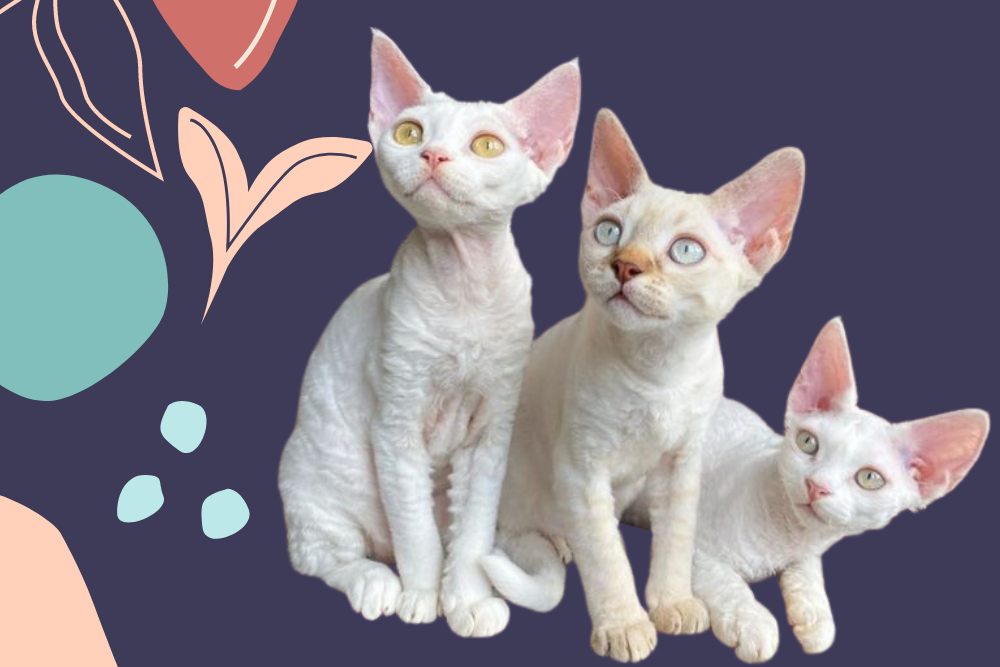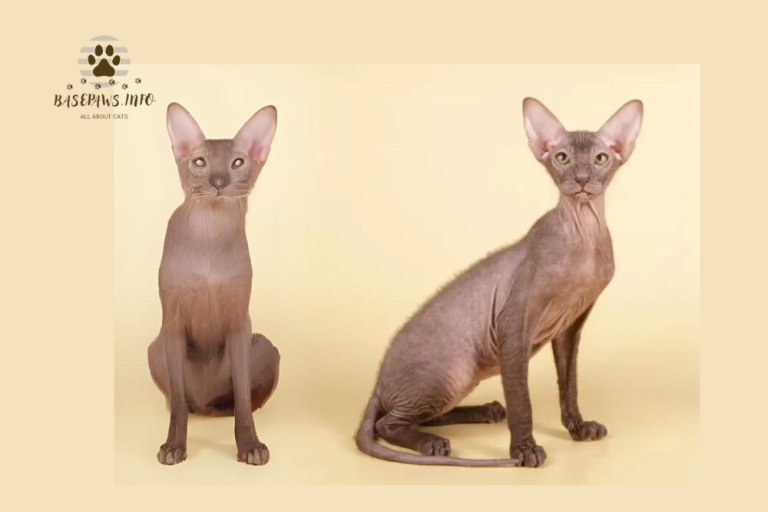Devon Rex Cat: A Purrfect Blend of Intelligence and Affection
Meet the Devon Rex cat – a delightful combination of intelligence and affection wrapped in a charmingly unique package. With their striking appearance, velvety fur, and playful demeanor, Devon Rex cats have captured the hearts of cat lovers worldwide. But it’s not just their curly whiskers and big ears that make them stand out; it’s their remarkable intelligence and loving nature that truly sets them apart. Whether they’re curling up in your lap for a cuddle session or engaging in a game of fetch, Devon Rex cats are sure to bring joy and companionship to any household.
Characteristics of the Devon Rex Cat
The Devon Rex is a unique breed known for its distinctive appearance and charming personality. Below, we delve into the detailed characteristics of this captivating feline:
Size and Appearance
The Devon Rex is a small to medium-sized cat with an adorable, pixie-like appearance. They have high cheekbones, large eyes, and prominent ears that contribute to their unique look. One of the most defining features of the Devon Rex is its coat, which is crinkled and waved all over its hard, muscular body. Due to a genetic mutation, the Devon Rex has fragile whiskers and eyebrows that may break off easily, giving them a “designer stubble” appearance.
Behavior and Personality
The Devon Rex is an active and curious cat with a playful disposition. They are known to be clever and inquisitive, always eager to explore their surroundings. This breed has a penchant for climbing and perching up high. It’s common to find a Devon Rex draped along the curtain rail or perched atop a door. To satisfy their natural inclination to climb, providing plenty of safe and appropriate opportunities such as cat trees, walkways, hammocks, and shelves is important.

Playful Nature
Devon Rex cats thrive on mental and physical stimulation. They enjoy engaging in fun cat games, such as hunting for food from food dispensing toys and solving puzzle toys. Interactive chase-play with their human companions is also a favorite pastime for these lively felines. Providing various forms of enrichment and interactive play is essential to keep a Devon Rex mentally stimulated and content.
Social Interaction
Devon Rex cats are highly sociable and enjoy being around people. They form strong bonds with their human family members and are often referred to as “velcro cats” for their tendency to stick close by. They are affectionate and enjoy cuddling with their owners, making them excellent companions for households seeking a loving and interactive pet.
Adaptability
Despite their active nature, Devon Rex cats adapt well to indoor living and can thrive in various environments. They are generally good with children and other pets, making them suitable for multi-pet households. However, proper introductions and socialization are key to ensuring harmonious relationships with other animals.
In conclusion, the Devon Rex cat is a delightful and charismatic companion with a unique appearance and playful personality. Their love for climbing, interactive play, and social interaction make them a joy to have as part of the family.
Breed History of the Devon Rex Cat
The Devon Rex is a fascinating breed with a unique origin story that dates back to the 1960s. Here’s a detailed account of its breed history:
- Discovery of Kirlee: The story of the Devon Rex began in 1960 when a curly-coated kitten was discovered in a litter of strays in Buckfastleigh, Devon, England. This special kitten was named Kirlee by his owner, who recognized the uniqueness of his coat.
- Contribution to Cornish Rex Project: Initially, Kirlee’s owner, aware of the Cornish Rex breed and the efforts to preserve its gene, offered Kirlee as a stud to contribute to that project. However, it soon became apparent that the gene responsible for Kirlee’s curly coat was different from that of the Cornish Rex.
- Establishment as a Separate Breed: Realizing that Kirlee represented a new and distinct breed, efforts were made to preserve the Devon Rex genes separately. Breeders worked diligently to maintain and develop the characteristics of the Devon Rex, focusing on its unique coat and charming personality.
- Ancestry and Legacy: All Devon Rex cats can trace their ancestry back to Kirlee, the original curly-coated kitten. Sadly, Kirlee’s life was cut short by a tragic car accident in 1970. However, his legacy lives on through his descendants, who continue to enchant cat lovers around the world with their distinctive appearance and playful nature.
- Recognition and Popularity: Over the years, the Devon Rex breed gained recognition and popularity among cat enthusiasts. It has become a beloved breed known for its affectionate temperament and unique physical features.
- Continued Preservation: Today, dedicated breeders continue to work to preserve and promote the Devon Rex breed. Through careful breeding practices and adherence to breed standards, they ensure that these charming cats maintain their distinctive qualities for future generations to enjoy.

Training and Care for Devon Rex Cats
Devon Rex cats are unique in both their appearance and care needs. Here’s a detailed guide on how to properly train and care for these charming felines:
- Grooming: The Devon Rex’s wavy coat requires minimal grooming compared to other breeds. Since their coat consists of sparse, breakable hairs, frequent brushing is not necessary and can even lead to bald patches. Instead, gently wipe your cat’s fur with a damp cloth on a weekly basis to remove any dirt or debris. Periodic baths may also be beneficial for keeping their coat clean and shiny.
- Hypoallergenic Properties: While there’s no such thing as a fully hypoallergenic cat, the Devon Rex comes close. Their short coat sheds minimally, making them one of the lowest maintenance shedding breeds. However, light shedding may still occur, so regular grooming and cleaning of your home may be necessary for allergy sufferers.
- Exercise Needs: Devon Rex cats are known for their outgoing personality and natural inclination toward exercise. It’s important to provide ample opportunities for physical activity to keep them healthy and happy. Encourage exercise through interactive play sessions, teaching tricks, and providing stimulating toys and climbing surfaces.
- Training Techniques: Devon Rexes are highly trainable and love to learn new tricks. Utilize positive reinforcement techniques such as clicker training to teach them commands and behaviors. Training sessions not only strengthen the bond between you and your cat but also provide valuable mental stimulation for this intelligent breed.
- Coat Care: Rubber brushes can be used to help remove dead hair from the Devon Rex’s coat, but caution should be exercised to avoid damaging the delicate hair. Additionally, their ears should be cleaned regularly to remove waxy deposits that may lead to ear infections. Cats with lighter coat colors may require sunblock on their ears during the summer months to prevent sunburn.
Health Problems of Devon Rex Cats
Devon Rex cats are generally healthy, but like all breeds, they may be prone to certain health issues. Here’s a detailed look at some of the common health problems that Devon Rex cats may face:
- Patellar Luxation: Patellar luxation is a condition where the kneecap “pops out” of its regular location. Devon Rex cats are thought to be genetically predisposed to this condition, which can cause lameness or an unusual gait. Regular veterinary check-ups can help monitor and manage this condition if present.
- Hypertrophic Cardiomyopathy (HCM): Hypertrophic cardiomyopathy is the most common type of heart disease in cats. In this condition, the wall of the left side of the heart thickens over time, leading to potential complications such as congestive heart failure, blood clots, and heart arrhythmias. Devon Rex cats are one of the breeds predisposed to HCM, so regular heart screenings are essential for early detection and management.
- Devon Rex Myopathy: Devon Rex myopathy is a hereditary muscle weakness condition that typically affects the head and neck of affected cats. Symptoms usually appear between three weeks to six months of age and may include weakness and difficulty with movement. This condition is inherited and recessive, so responsible breeding practices are crucial to minimize its occurrence.
- Polycystic Kidney Disease (PKD): Polycystic kidney disease is an inherited and incurable condition caused by a mutated gene. Cysts form on the kidneys and can lead to various symptoms such as high blood pressure, blood in the urine, nausea, vomiting, weight loss, and lethargy. Regular monitoring and management of symptoms are necessary to maintain the cat’s quality of life.
- Hip Dysplasia: Hip dysplasia is a degenerative condition where the hip joint develops abnormally. It can cause symptoms such as difficulty jumping, stiffness, decreased range of motion, limping, and exercise intolerance. While more commonly associated with dogs, Devon Rex cats may also be affected by hip dysplasia, although it is less common.
In conclusion, while Devon Rex cats are generally healthy, it’s important for owners to be aware of potential health issues and to provide regular veterinary care to ensure their well-being. Responsible breeding practices and early detection of any health problems are key to maintaining the health and longevity of this beloved breed.

Devon Rex Overview: A Unique and Playful Breed
The Devon Rex cat is a charming and unique breed known for its playful nature and distinctive appearance. Whether you’re a seasoned cat owner or considering adding a new feline friend to your family, here’s everything you need to know about the delightful Devon Rex.
Playful Nature: Devon Rexes are renowned for their playful and mischievous personalities. With their high energy levels and curious nature, they are always ready for fun and adventure. From chasing toys to exploring every nook and cranny of your home, these cats will keep you entertained for hours on end.
- Family-Friendly: Devon Rexes make wonderful additions to any family. Their affectionate nature and love for human interaction mean they thrive in households with plenty of attention and affection. They enjoy being part of the action and will often follow their favorite humans around the house, eager to join in on the fun.
- Unique Appearance: One of the most striking features of the Devon Rex is its unique appearance. With their large ears, expressive eyes, and soft, wavy coat, they have an unmistakable charm that sets them apart from other breeds. Their coat may come in a variety of colors and patterns, adding to their allure.
Pros of Devon Rexes:
- Allergy-Friendly: Devon Rex cats are often considered hypoallergenic due to their short, curly coat, making them a great choice for allergy sufferers.
- Intelligent and Trainable: These cats are highly intelligent and can learn tricks and commands with ease. They enjoy interactive play and mental stimulation, making training sessions both fun and rewarding.
- Extremely Playful: Devon Rexes has boundless energy and love to play. From chasing toys to engaging in interactive games, they are always up for a good time.
Cons of Devon Rexes:
- Mischievous: Their playful nature can sometimes lead to mischief, such as getting into cabinets or knocking things over. It’s important to provide them with plenty of toys and activities to keep them entertained.
- Requires Ample Attention: Devon Rexes thrive on attention and can become bored or anxious if left alone for long periods. They do best in homes where they receive plenty of interaction and stimulation.
- Large Appetites: These cats have hearty appetites and may be prone to overeating if not monitored. It’s important to feed them a balanced diet and regulate their food intake to prevent obesity.
Devon Rex Fun Facts
The Devon Rex cat breed is not only adorable and playful but also has some interesting and unique characteristics. Here are some fun facts about Devon Rex cats:
- Disney Stars: Two Devon Rex cats played the part of mischievous antagonists in Disney’s ‘Lady and the Tramp’ film. Appropriately enough, their characters’ names were Devon and Rex. This playful nod to the breed’s name showcases the Devon Rex’s reputation for mischief and charm.
- Celebrity Owners: Among famous Devon Rex cat owners is Dita Von Teese, the renowned burlesque performer. Her pet, Aleister, although having passed away in 2020, still has a dedicated Instagram profile which amassed over 108k followers. This highlights the breed’s appeal even among celebrities, who are drawn to their unique personality and appearance.
- Unique Whiskers: One unique feature Devon Rex cats possess is their whiskers, which are very short and often tightly curled, seeming almost invisible. This distinctive trait adds to their whimsical and pixie-like appearance, setting them apart from other cat breeds.
- Inspiration for E.T.: It’s been rumored that Steven Spielberg’s famous E.T. character was inspired by the director’s own Devon Rex cat. The cat’s large eyes, elongated face, and unique appearance may have influenced Spielberg’s vision for the beloved extraterrestrial character, adding another layer of charm to the breed’s legacy.
- Curly-Coated Pioneers: Devon Rex cats are pioneers in the world of curly-coated breeds. Their unique coat, which is soft, wavy, and often described as “rexed,” is the result of a genetic mutation. This distinctive feature has captured the hearts of cat lovers worldwide and continues to make the Devon Rex a beloved breed.
- High-Energy Companions: Devon Rex cats are known for their playful and high-energy personalities. They enjoy interactive play and thrive on attention from their human companions. Their mischievous antics and affectionate nature make them wonderful companions for families and individuals alike.
FAQ
Q: How much is a Devon Rex cat? A: The price of a Devon Rex cat can vary depending on factors such as pedigree, age, and breeder. On average, expect to pay between $800 to $1500.
Q: How long do Devon Rex cats live? A: Devon Rex cats have a lifespan of 9 to 15 years with proper care and regular veterinary check-ups.
Q: How big do Devon Rex cats get? A: Devon Rex cats typically weigh between 6 to 9 pounds and have a length of around 18 inches.
Conclusion
The Devon Rex cat is a delightful companion known for its playful nature and unique appearance. Whether you’re considering adding one to your family or simply want to learn more about this fascinating breed, understanding their characteristics, care needs, and health considerations is essential for providing them with a happy and fulfilling life.







